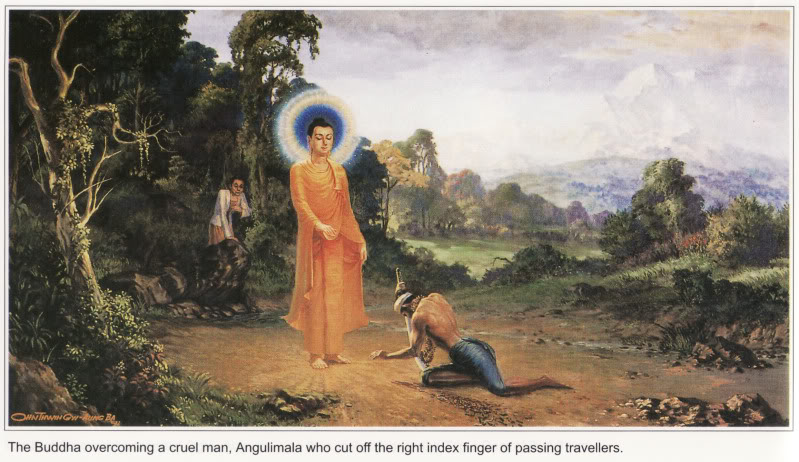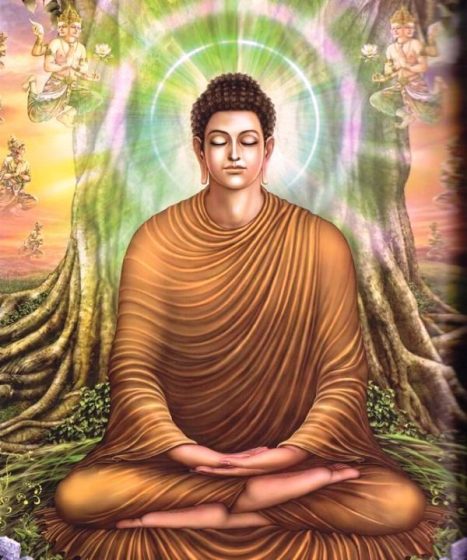The story that touched my heart very deeply

In previous life, Angulimala was a close relative of the Bodhisatta, his uncle. Now, when their lives had crossed again, and the Buddha saw the grave danger in which Angulimala had placed himself, he did not hesitate to walk the thirty miles to meet him and save him. The law of karma plays such a major role in this story also. Everyone is responsible for his or her action, whether during this lifetime or from the previous lives.
Angulimala’s birth name is Ahimsaka, means Harmless. This story touched my heart very deeply till this day. Ahimsaka was such a handsome, intelligent and innocent young man with a gorgeous girlfriend, which made his classmates become very jealous. Because of this ignorance, they turned Ahimsaka’s life 360 degrees around.
His mother, was the last person, Angulimala wanted to kill to complete the thousand fingers. So steeped was his mind in the habit of killing without scruples. At that moment the Buddha appeared on the road between Angulimala and his mother. Seeing him, Angulimala thought: “Why should I kill my mother for the sake of one finger when there is someone else? Let her live.” So he was still moved by merely seeing his mother, though he was not aware that she had gone that hard road out of love for him. To forsake getting his mother’s finger was, of course, made easier for him when he saw another figure, that of a monk, approach. He did not know, however, that it was a similar offense against the most sacred in life to kill an ascetic, a monk. He was only concerned with completing his thousand fingers.
Angulimala took up his sword and shield and buckled on his bow and quiver and he followed behind the Blessed One.
Then the Blessed One performed such a feat of supernormal power that the bandit Angulimala, going as fast as he could, was unable to catch up with the Blessed One, who was walking at his normal pace. Then he thought: “It is marvelous! Formerly I caught up with even a galloping elephant and seized it; I caught up with even a galloping horse and seized it; I caught up with even a galloping chariot and seized it; I caught up with even a galloping deer and seized it. But yet, though I am going as fast as I can, I am unable to catch up with this monk who is walking at his normal pace.” He stopped and called “Stop, monk! Stop, monk!”
“I have stopped, Angulimala. Do you stop, too.”
Then the bandit Angulimala thought: “These monks, followers of the Sakya scion, speak truth, assert truth; but though this monk is walking, yet he says ‘I have stopped, Angulimala; do you stop, too.’ Suppose I question the monk?”
Then he addressed the Blessed One in stanzas thus:
“While you are walking monk, you tell me you have stopped;
But now, when I have stopped, you say I have not stopped.
I ask you now, O monk what is the meaning of it;
How is it you have stopped and I have not?”
(The Blessed One:)
“Angulimala, I have stopped for ever,
Foreswearing violence to every living being;
But you have no restraint towards things that breathe;
So that is why I have stopped and you have not.”
When Angulimala heard these words, a second and greater change of heart came over him. He felt as if the current of his suppressed nobler and purer urges had broken through the dam of hardened cruelty that had been built up through habituation in all those last years of his life. Angulimala felt now deeply moved by the appearance and the words of the Buddha.
Angulimala’s response and what followed is again tersely told in the Sutta:
(Angulimala:)
“Oh, at long last a sage revered by me,
This monk, has now appeared in the great forest;
Indeed, I will for sure renounce all evil,
Hearing your stanzas showing the Dhamma.”
So saying, the bandit took his sword and weapons
And flung them in a gaping chasm’s pit;
The bandit worshipped the Sublime One’s feet,
And then and there asked for the Going-forth.
The Enlightened One, the Sage of Great Compassion,
The Teacher of the world with all its gods,
Addressed him with these words “Come bhikkhu,”
And that was how he became to be a bhikkhu.
Read full story https://plus.google.com/u/0/117879909215135297796/posts/LiiCMhh2J5M
This post has been reshared 5 times on Google+
View this post on Google+









